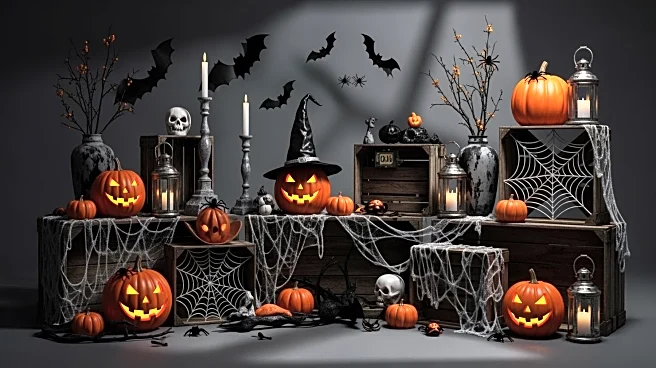What's Happening?
Retailers across the U.S. are capitalizing on Halloween's growing popularity by extending the season and introducing themed products earlier in the year. According to a report by PwC, more than three-quarters of adults plan to celebrate Halloween, spending
an average of nearly $290 on costumes, decorations, and seasonal activities. Retailers like Michaels and Home Depot have started offering Halloween products as early as June, leveraging the midyear observance of 'Summerween' to kickstart sales. This strategy has proven effective, with Halloween spending expected to reach a record $13.1 billion in 2025, marking a 13% increase from the previous year.
Why It's Important?
The extended Halloween season represents a significant opportunity for retailers to boost sales during a period of economic uncertainty. By tapping into the emotional appeal of Halloween, retailers can engage consumers who are otherwise cautious about spending. The trend is particularly driven by Gen Z and millennials, who are leading the way in Halloween participation. This demographic's enthusiasm for Halloween provides retailers with a chance to test pricing strategies and promotional tactics that could be applied to other holiday seasons, potentially influencing broader retail practices.
What's Next?
Retailers may continue to explore year-round opportunities for Halloween-themed products and experiences, given the holiday's emotional and cultural resonance. Companies like Universal Destinations and Experiences are already investing in permanent horror-themed attractions, indicating a potential shift towards more immersive and experiential retail offerings. As Gen Z continues to influence retail trends, businesses might adapt their strategies to cater to this demographic's preferences, focusing on creating engaging in-store experiences that complement online shopping habits.
Beyond the Headlines
The growing popularity of Halloween reflects broader cultural trends towards 'comfort culture,' where consumers seek joy and community through shared experiences. This shift may encourage retailers to explore similar strategies for other holidays, emphasizing emotional connections and community engagement. Additionally, the success of Halloween-themed retail could inspire businesses to innovate in other areas, such as sustainable and ethical product offerings, to align with consumer values.


















